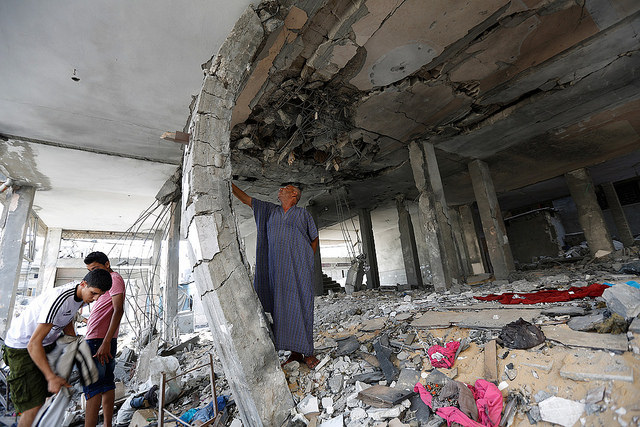by Mitchell Plitnick
When Israel, or any country, engages in armed conflict with a guerrilla group, even if that group controls significant territory and resources, it is a virtual truism that the longer the fighting persists, the greater the gains for the non-state actor. In Gaza, Hamas’ quasi-governmental position still leaves it in the role of the guerrilla enemy. And with the events of the past few days, it is worth asking if Israel is not losing this “war.”
The Israeli government is pointing to several objectives, chiefly the destruction of some tunnels in Gaza that lead into Israel and at degrading and diminishing Hamas’ ability to fire rockets. While the frequency of rocket fire from Gaza has decreased somewhat in the last few days, it has obviously not stopped. And when the heat dies down, Israelis are bound to notice that the tunnels Netanyahu is making such a point about had not been used for infiltration until after the fighting began.
By the same token, Israelis might also notice that, at this writing, 35 Israelis have been killed, three of them civilians. In the five and half years since the end of Operation Cast Lead, a grand total of 38 Israelis were killed by Palestinians, combining both Gaza and the West Bank, 10 of them civilians. When a sober assessment of all this is made in Israel, the result might not look top good if Netanyahu has so little to show for it.
Hamas, on the other hand, may have quite a bit to toot their collective horns about. Yes, the death toll, which is now topping 700, is horrific, as is the number of injured (now over 4,100), not to mention the damage to Gaza’s already crumbling infrastructure and the destruction of 500 homes, some 16 mosques and two hospitals. But Hamas, despite having lost a lot of popularity over the years, is standing up to Israel and insisting on an end to its siege of the Gaza Strip, which is preventing many common goods from getting in and just about all exports from going out.
Moreover, Hamas has put all of Israel on high alert, disrupting daily life not just in the south, but as far north as Haifa, and as far east as Jerusalem. Residents of Tel Aviv are not living in “the bubble” they did five years ago; now they are repeatedly hustling to shelters when warning sirens go off. Most importantly of all, Hamas forced US and European airlines to suspend all flights to Israel for two days when a rocket from Gaza came within a mile of Ben Gurion International (BGI) airport.
That victory might be far more profound than what anyone in Gaza has so far realized. In the United States, the Federal Aviation Administration (FAA), which is as apolitical as a federal agency can get, suspended flights to Israel for obvious reasons: in the wake of the downing of the Malaysian flight over Ukraine, a rocket coming that close to BGI was too much of a risk for the FAA to take.
But in the United States, any decision that Israel doesn’t like instantly becomes politicized, even though it is obvious to anyone who knows anything about the US government that the president had nothing to do with this call — it is entirely within the FAA’s bailiwick. But Israel complained that the decision sent “the wrong message,” to which the State Department replied, “The only consideration in issuing the notice was the safety and security of our citizens.”
Former New York City Mayor Michael Bloomberg immediately flew to Israel and stated that he felt as safe there as anywhere. But Bloomberg’s grandstand play also serves to undermine the rationale for this entire operation by Israel — after all, if it is that safe when fire is being exchanged, how can Israel justify their own losses, let alone the far more massive toll of death and destruction in Gaza?
Republican Senator Ted Cruz, never one to let a lunatic theory pass by unexploited, went so far as to accuse President Barack Obama of using “…a federal regulatory agency to launch an economic boycott on Israel, in order to try to force our ally to comply with his foreign-policy demands.” No kidding, he really said that.
With all of this tumult resulting from one rocket, Hamas can certainly claim a major win in this regard.
Hamas has also made political gains. Palestinian President Mahmoud Abbas has been working to help find a ceasefire formula. In the past, Hamas would disavow Abbas’ authority to negotiate for them, but they have not done so this time. That’s because Abbas is arguing for Hamas’ terms for a ceasefire. That makes Abbas, rather than any Egyptian or Turkish leader, the contact point between Hamas and Israel. It also symbolically demonstrates that the Palestinians have a unified government — Abbas is presenting himself as the leader of all of Palestine, including Gaza, without saying so or ruffling any of Hamas’ feathers.
Israel’s goal in starting this round of fighting was to destroy the unity deal between the Palestinian Authority and Hamas. Thus far, the opposite seems to have materialized. Abbas is in agreement with Hamas’ goals, and is apparently fully representing them. That represents a major failure for Netanyahu. But that outcome is far from assured.
The statement by Hanan Ashrawi, a member of the Palestine Liberation Organization (PLO) executive committee, that the Palestinians would now pursue their goals through the international judicial system, seemed like a potential game-changer. It is telling, though, that after Ashrawi made her statement, welcomed by many of us who advocate for an equitable international judicial system and see its value for the Palestinians, there has been virtually no follow-up.
Indeed, going, for example, to the International Criminal Court (ICC) might have very different effects than one might imagine for the Palestinians. Unlike the United Nations Human Rights Council, which is really the one place at the UN that Israel’s complaints of unfair treatment have real merit, the ICC is not a politically driven body. Its unfortunate bias against poor countries, countries that do not have great power backing and, particularly, sub-Saharan African countries is based on what cases are brought before it, and that, sadly, is entirely dictated by politics.
But if the ICC were to investigate the fighting in Gaza, it might well be inclined to investigate both sides. And, if Palestine, with its new-found recognition as a state, were to go to the ICC, they would be placing themselves under its jurisdiction. The simple fact is that, while Israel has devastated civilians, Hamas has also been targeting civilians, albeit with much less success. That, however, is also a crime. But Israel has not joined the ICC, so it is not under ICC jurisdiction. The ICC could not compel any of its leaders to appear, much less answer charges.
Israel is reportedly considering a ceasefire deal that would be modeled after the 2006 accord achieved in Lebanon. If that were followed, the PA would assume control over Gaza. Hamas might have a tough time arguing with that, given their defense of the unity government. The PA would have, presumably, the same armament it has in the West Bank, but all other factions would be forced to disarm, surrender rockets and dismantle tunnels under international inspection. And in exchange, Israel would end its blockade of Gaza’s coastline and ease restrictions at the border crossings.
That sort of agreement would absolutely represent a Palestinian victory, but it would also mean Hamas would no longer exercise control over Gaza. They would sacrifice their ability to re-launch an armed resistance until they could find a way to re-arm clandestinely. That might prove very difficult — they haven’t been very successful at it in the West Bank, largely due to PA efforts. For the group itself, it would mean a major loss. But the objectives of the current fighting would have been achieved — ending the siege and preserving the unity government.
Netanyahu would also claim victory in such an event. But it would remain clear that the Palestinians were now unified and speaking with one voice. Abbas could no longer see Hamas as an opposition party, but as part of his constituency, and this whole experience seems to have forced him out of his habit of going along with US and Israeli diktats. The Palestinians would be strengthened politically, even as they lose Hamas’ paltry military capabilities. Netanyahu would have also failed to destroy the unity government, which is what this was all about. But a nullified Hamas would be an easy image to present as a victory to the Israeli people, who have been lied to by Bibi from the beginning and are thus largely unaware of the real aims of this onslaught.
It remains to be seen if such a ceasefire agreement is actually being considered. I really can’t see Bibi agreeing to it; he is absolutely obsessed with keeping the Palestinians divided, and his stated refusal to even consider a two-state solution means he is obsessed with good reason. I’m not at all sure Hamas would accept such a deal, even though it might boost them politically. And right now, it is Hamas, not Israel, who is dealing from a position of strength. Despite the pounding Gaza is getting, Hamas seems to have gotten the issue of lifting the siege on the table, as even the US keeps saying that the “underlying issues” must be dealt with, and even when the EU is scolding Hamas, they are also calling Israel’s acts “criminal.”
When Hamas initially refused the ceasefire, I understood, but also believed that they would eventually be forced to take that deal, and that their refusal would result in many more dead Palestinians. That latter part has proven true, and it is still possible that Israel, the US and Egypt will eventually force Hamas to accept the terms they dictated. But it’s looking less and less likely that the Egyptian ceasefire accord will be the one Hamas has to accept. Is it worth the price in blood? Only the people of Gaza can answer that question.
Photo: The ongoing Israeli airstrikes in the Gaza Strip, one of the most densely populated regions in the world, have destroyed essential infrastructure including family homes, fishermen’s boats, water systems and health centers. Credit: Mohammed Al Baba/Oxfam






Mitchell Plitnick’s posts continue to stray farther and farther from reality. The IDF continues to uncover and destroy HAMAS tunnels that were used to store weapons and were meant to facilitate infiltration into Israel for the purpose of killing and maiming as many civilians as possible and then to kidnap Israeli children back to Gaza. Anyone who thinks destroying these tunnels is a loss for Israel is delusional.
I am not sure if Plitnick is also delusional regarding Prime Minister Netanyahu or just lying. Yes, Netanyahu said he wouldn’t accept a two-state solution but he changed his mind and now endorses the idea. The only chance for peace is for the IDF to deal a strong blow to HAMAS and have those wanna be genocidal maniacs (read the HAMAS charter) replaced by Fatah. Then peace has a real chance.
This is one of the best pieces of analysis that I have see on the current situation. Mr. Plitnick’s articles are usually excellent in their no-nonsense, fact-filled content and impeccable logic, but this one is a gem. There is no question that so far Palestinians have won. They have paid a dear price with horrific losses of life but they must have made these political calculations prior to the start of this round. Because this war is not won or lost on the ground (or air, or sea). it’s won and lost in the international public opinion, something that the pro-Israel forces have had in a headlock for a long time. Slowly, with each one of these massacres that Israel has unleashed in the name “uprooting terror” and such (which ultimately uproot the population, no the so-called terror network, because if Israel goes through this every two years to finish Hamas once and for all, why are we here time after time after time?), the court of public opinion has turned a little more in favor of the heavy underdogs in this conflict, and this particular massacre might be the tipping point. Just looking at the international reaction one can sense the clear change in momentum, the horrified outrage of most nations. For the first time you see many Western countries question their leaders parroting the mantra of “Israel has a right to defend itself” every time Israeli military unleashes indiscriminate and prolonged shelling of civilians and the absolute devastation it leaves behind, which surprisingly never “uproots” the “terror network”. Either they are really really bad at “uprooting terror”, or they actually mean to kill civilians as a way to “mow the lawn” as some Israelis have shameless expressed.
The world is catching on to all that. It’s hard for the world to keep believing the party that’s bombing civilians, killing and maiming thousands of those same people they have dispossessed and ethnically cleansed is actually the victim, and not the one collecting their unarmed dead relatives from refugee camps. The world now tends to believe humanists like Mitchell Plitnicks and not propagandaists like the above poster with their old, worn out arguments justifying ethnic cleansing, apartheid, permanent occupation and slow, painful genocide.
Amazing rubbish from Ted Cruz. Perhaps one should get jaded at some point? Great piece.
An excellent piece by Plitnick though he misses a couple of points. Firstly, the whole point of this exercise, as far as Netanyahu is concerned, is to see if he can push it all the way to full on invasion and permanent occupation with an eventual eye on annexation.
Of course, Israel has the wherewithal to have actually accomplished that within just a few days if it thought it could get away with it. Instead, however, Netanyahu is playing the usual game of pretending to be the victim and claiming provocation for his actions and in that way hopes that for every reaction from Hamas he can retaliate even further and step up the aggression just enough to get Hamas going just a bit more so he can step it up yet further until eventually he gets what he wants. It’s all designed to swing public opinion – as much in Israel as around the world – to support a full-on occupation. For Netanyahu it’s like walking a tightrope; he has to play it by ear while keeping in mind his ultimate objective.
Israel has been playing this game for years; taking three steps forward and two steps back but all the while gaining a little something like the Golan Heights and huge settlements in the West Bank which will continue to grow until there’s no Palestine left. Problem is for Netanyahu, times running out. The world is slowly waking up to what they’re up to.
The other point missed in this article is the delicate business regarding potential war crimes committed by Hamas. This article might help folk think about the pros and cons of the question.
@lataan – – Israel DOES NOT want to annex the Gaza Strip. Or areas of the West Bank with too many Muslims.